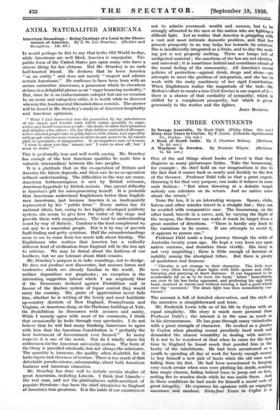ANIMA I•TATURALITER AMERICANA
IT would perhaps be fair to say that in the Old World to-day, while Americans are well liked, America is unpopular. The public form of the United States jars upon many who have a sincere liking for her citizens. But Mr. Strachey is no such half-hearted friend. He declares that he loves America " as an entity " and does not merely " respect and admire certain Americans." He confesses to have been born with an anima naluraliter Americana, a possession which he elsewhere defines in a delightful phrase as an " eager bouncing mentality." But, since he is no indiscriminate eulogist but can on occasion be an acute and outspoken critic, it is worth while to discover wherein this fundamental likemindedness consists. The answer will be found in Mr. Strachey's analysis of American hospitality and American optimism.
" What I had discovered was the possession by my. .entertainers of the simple and lovable trait which comes specially to eager, active and unself -conscious people—the desire to share their pleasures and delights with others—the joy that children and indeed all super- active-minded people take in going halves with others, and especially with people who for some reason or other do not seem to be by nature glad, or optimistic, or imaginative. In an impulsive man or woman
I want to show you this ' means, not I want to show off,' but I want to share.' " This is profoundly true and well worth saying. Mr. Strachey has enough of the best American qualities to make him a valuable intermediary between the two peoples.
It is a platitude that on the co-operation of Britain and America the future depends, and there can be no co-operation without understanding. The difficulties in the way are many. American forthcomingness is met by British reticence, American hyperbole by British meiosis. One special difficulty is America's gift for misrepresenting herself. It is probable that Americans understand Englishmen better than English- men Americans, just because America is so inadequately represented by her " public form." Every nation has its national idiots, but, owing to her highly developed publicity system, she seems to give hers the centre of the stage and provide them with megaphones. The road to understanding is not by way of flattery. Candour is the least compliment we can pay to a masculine people. Nor is it by way of peevish fault-finding and petty cynicism. Half the misunderstandings seem to me to come from too much talk about kinship. The Englishman who . realizes that America has a radically different kind of civilization from England will be the less apt to criticize. We may be finical about the fashions of our brothers, but we are tolerant about third cousins.
Mr. Strachey's purpose is to take soundings, not to dredge. He does not produce new discoveries, but assesses forces and tendencies which are already familiar to the world. He neither dogmatizes nor prophesies ; an exception is the interesting suggestion (about which I am sceptical) that if the Democrats declared against Prohibition and in favour of the Quebec system of liquor control they would carry the country. His gusto of appreciation never fails him, whether he is writing of the lovely and most habitable up-country districts of New England, Pennsylvania and Virginia, or American slang, or the Harkness buildings at Yale.
On Prohibition he discourses with acumen and sanity. While I warmly agree with most of his comments, I think
that occasionally he looks through rosy spectacles. I do not believe that he will find many thinking Americans to agree with him that the American Constitution is ". probably the best instrument of Government ever framed." In many
respects it is one of the worst. Nor do I wholly shaie his enthusiasm for the American university system. The form of the thing is provided wholesale, but not always the substance.
The quantity is immense, the quality often doubtful, for it lacks rigour and closeness of texture. There is too much of that detestable pseudo-science, salesmanship, about both American business and American education.
Mr. Strachey has done well to include certain studies of great Americans, including Lincoln. I think that Lincoln—
the real man, and not the platitudinous uplift-merchant of popular literature—has been the chief interpreter to England of America's true greatness. It is the habit of our countrymen
not to admire overmuch wealth and success, but to be strongly attracted to the men or the nation who are fighting a difficult fight. Let us realize that America is grappling with a vast and most intricate domestic problem, and that her present prosperity in no way helps her towards its solution. She is insufficiently integrated as a State, and to-day the melt- ing, pot is not properly melting. There are lumps left of undigested material ; the sanctions of the law:are not identica and universal ; it is sometimes behind and sometimes ahead of the moral feeling of the community. All America's recent policies of protection—against drink, drugs and aliens—are attempts to meet the problem of integration, and she has to work with the rusty machinery of her rigid Constitution. When Englishmen realize the magnitude of the task—Mr, Mellon's effort to create a true Civil Service is one aspect of it— there is a chance of that cordiality of sympathy, which is chilled by a complacent prosperity, but which is given generously to the worker and the fighter.
Jonw BUCHAN.






























































 Previous page
Previous page